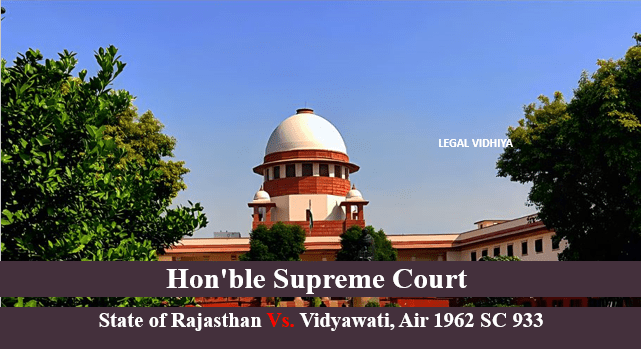
| Citation | 1962 AIR 933, 1962 SCR Supl. (2) 989 |
| Date of Judgment | 02/02/1962 |
| Court | Supreme Court of India |
| Appellant | THE STATE OF RAJASTHAN |
| Respondent | MST. VIDHYAWATI AND ANOTHER |
| Bench | Sinha, Bhuvneshwar P.(Cj), Kapur, J.L., Hidayatullah, M., Shah, J.C., Mudholkar, J.R. |
| Referred | A.I.R. 1962, S.C. 933. |
FACTS :
- Lokumal who was an employee of Rajasthan State as a motor driver. In February 1952, he was working as the driver of a government jeep car, numbered RUM 49, registered under the Udhipur Collectorate. The car was given to the workshop for necessary repairs.
- After the repairs were finished, Lokumal, while driving the car back along a public road, in the evening of February 11, 1952, knocked down one Jagdishlal, who was walking on the footpath by the said of the public road in Udaipur city, causing him multiple injuries, including fractures of the skull and backbone, resulting in his death three days later, in the hospital where he had been removed for treatment.
- The plaintiffs who are Jagdishlal’s widow, Vidyawati and a minor daughter, aged three years, through her mother as next friend sued the said Lokumal and the State of Rajasthan for damages for the tort aforesaid. They claimed the compensation of Rs. 25,000/- from both the defendants. The first defendant remained ex-parte. The suit was contested only by the second defendant on a number of issues.
- The trial court decreed ex parte the suit against the first defendant, and dismissed it without costs against the second defendant.
- The High Court of Rajasthan passed a decree in favour of the plaintiffs allowing compensation of Rs. 15,000/- against the State of Rajasthan also, which is the appellant in this Court.
- On appeal by the plaintiffs, the High Court of Rajasthan (Wanchoo C.J., and D. S. Dave J.) allowed the appeal and decreed the suit against the second defendant also, with costs in both the Courts.
ISSUE:
- Whether the state is liable under article 300 of the constitution for the tortious acts done by its servants.
- Whether the suit was being maintained “in exercise of sovereign powers” and not as part of any commercial activity of the State.
ARGUMENTS:
The State of Rajasthan applied for and obtained the necessary certificate “that the case fulfills the requirements of Art. 133(1)(c) of the Constitution of India”.
Counsel for the appellant significantly raised two questions, namely, (1) as per Article 300 of the Constitution, the State of Rajasthan was not liable as the concerned Indian State would not have been liable if the matter had arisen before the Constitution came into force; and (2) that the Jeep car, which the suit claimed was due to rash and negligent driving, was being retained “in the exercise of sovereign powers”, the more serious of the two raised before us.
It has been argued on behalf of the plaintiffs- respondents that chapter III of part XII of the Constitution, which is headed as “Property, Contracts, Rights, Liabilities, Obligations and Suits”, contains other Articles in the Chapter dealing with rights and liabilities, namely, Arts. 294 and 295 and that Art. 300 is confined to only the question in whose name suits and proceedings may be commenced.
JUDGEMENT:
The Hon’ble Supreme Court of India decided to hear this case in the appeal, in furtherance of the certificate given by the Hon’ble Rajasthan High Court under Article 133, as the question of interpretation of Article 300 was involved, which was a substantial matter of law. The Supreme court recognised that the government could be sued. The court had recognised the right of a government servant to sue the Government for recovery of arrears in salary in the case of State of Bihar v. Abdul Majid[1].
It then examined the state’s liability under the Government of India Act, 1935, and other statutes, concluding that the state’s liability post-independence is identical to that of the East India Company, as determined in Peninsular and Oriental Steam Navigation Co. v. The Secretary of State for India.[2] The issue that arose was the extent of the government’s vicarious liability for the tortuous behaviour of its employees while on the job.
CONCLUSION:
The Court clarified that the appointment of the driver of the jeep car was an activity which was in no way connected with the sovereign power of the State. The Rajasthan State v. Vidyavati case was reviewed by the Supreme Court under Article 300 of the Constitution. The court rejected the State’s plea of exemption and held that the State was liable for the fraudulent act of the driver like any other employer.
This Article is written by Lovely Singh of Agra College Agra , Intern at Legal Vidhiya.




0 Comments